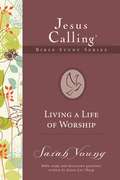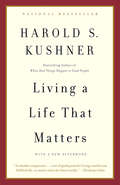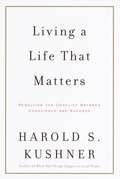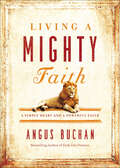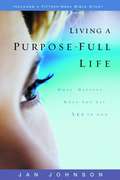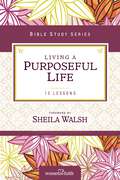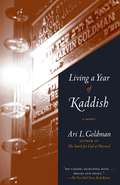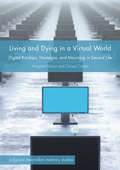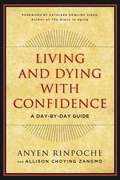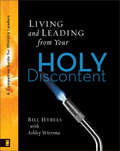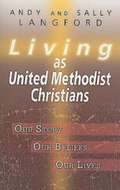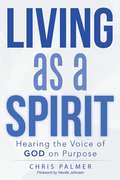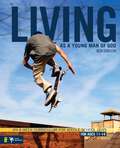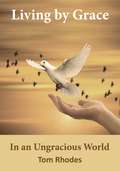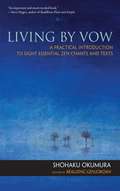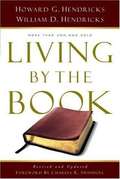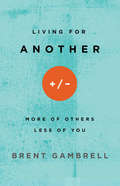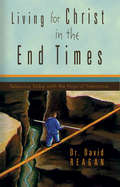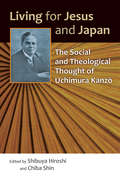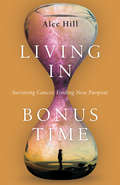- Table View
- List View
Living a Life of Worship (Jesus Calling Bible Studies)
by Sarah YoungAfter many years of writing in her prayer journal, missionary Sarah Young decided to be more attentive to the Savior&’s voice and listen for what He was saying to her. The result was Jesus Calling, a collection of personal reflections based on Jesus&’ own words of hope, guidance, and peace found in the Scriptures. Through these messages, countless people have been encouraged to experience a deeper relationship with the Lord as they also learn to listen for His voice in the pages of the Bible. In Living a Life of Worship, the fourth study in theJesus Calling Bible Study Series, you will discover how thankfulness and worship always open the door for entering into God&’s presence and blessings. Even the most routine part of your day can be a spiritual act of worship when you are living close to God, and seeing from His perspective will allow you to truly be able to &“give thanks in all circumstances&” (1 Thessalonians 5:18). Each of the Jesus Calling Bible Studies include devotional readings from Jesus Calling, selected passages of Scripture for reflection, Bible Study questions, and additional questions and activities to help you apply and live out the material during the week. This study can be used for personal reflection and Bible study or in a small-group setting.
Living a Life that Matters
by Harold S. KushnerMost of us need to feel that we matter in some way; perhaps this explains the high value placed on titles, corner offices, and even fleeting celebrity. But most of us also need to feel that we are good people. In this luminous yet practical book of spiritual advice, Harold Kushner bridges the gap between these seemingly irreconcilable needs, showing us how even our smallest daily actions can become stepping stones toward integrity.Drawing on the stories of his own congregants, on literature, current events and, above all, on the Biblical story of Jacob, the worldly trickster who evolves into a man of God --Kushner addresses some of the most persistent dilemmas of the human condition: Why do decent people so often violate their moral standards? How can we pursue justice without giving in to the lure of revenge? How can we turn our relationships with family and friends into genuine sources of meaning? Persuasive and sympathetic, filled with humanity and warmth, Living a Life That Matters is a deeply rewarding book. From the Trade Paperback edition.
Living a Life that Matters: Resolving the Conflict Between Conscience and Success
by Harold S. KushnerHere is an exerpt from Chapter One: "The Two Voices of God Like many people, I live in two worlds. Much of the time, I live in the world of work and commerce, eating, working, and paying my bills. It is a world that honors people for being attractive and productive. It reveres winners and scorns losers, as reflected in its treatment of devoted public servants who lose an election or in the billboard displayed at the Atlanta Olympic Games a few years ago: "You don't win the silver medal, you lose the gold." As in most contests, there are many more losers than winners, so most of the citizens of that world spend a lot of time worrying that they don't measure up. But, fortunately, there is another world where, even before I entered it professionally, I have spent some of my time. As a religiously committed person, I live in the world of faith, the world of the spirit. Its heroes are models of compassion rather than competition. In that world, you win through sacrifice and self-restraint. You win by helping your neighbor and sharing with him rather than by finding his weakness and defeating him. And in the world of the spirit, there are many more winners than losers."
Living a Mighty Faith: A Simple Heart and a Powerful Faith
by Angus BuchanA simple potato farmer with a mighty faith and a willing heart—God steps in and changes everything, just like He can do for you.Internationally bestselling author and ministry leader Angus Buchan is the author of Faith Like Potatoes and the founder of Mighty Men Conferences, which have drawn more than 500,000 attendees to Buchan&’s Shalom Farm Ministry in South Africa, with additional Mighty Men Conferences drawing thousands more worldwide.Although Buchan speaks to thousands all over the world, he and his wife, Jill, are simple potato farmers who know what it means to allow God to do more through them than they could ever imagine. They founded Beth-Hatlaim, a ministry that aims to provide a permanent home for children who have been abandoned or orphaned, with no known relatives. Buchan travels and leads crusades similar to the likes of Billy Graham.This 365-day devotional will help you see what God can do in your life when you believe big and open your heart. Devotions focus on sharing your faith, serving others, and becoming a little more like Jesus each day.
Living a Purpose-Full Life: What Happens When You Say Yes to God
by Jan JohnsonWomen crave a sense of purpose. They yearn to know that their efforts will impact other people's lives. Experts urge them to say "no" to the things that drain or distract them-yet, even as women struggle to maintain a sense of control, they long to discover the calling to which their hearts must joyously respond: "Yes!" That longing, explains author Jan Johnson, can be satisfied only when a woman discovers-and lives out-her God-given purpose.God's call on a woman's life isn't meant to remain a mystery. More than a role, a spiritual gift, or a job she loves, finding her purpose is about knowing who she is: God's woman in this world. Within these pages readers will discover what purpose in life is, why they need it, and how they can find it. Best of all, each woman will simplify her life by focusing on the things that matter most to her and God, as she becomes the woman he desires her to be.From the Trade Paperback edition.
Living a Purposeful Life (Women of Faith Study Guide Series)
by Sheila WalshWhen it comes to God's will for our lives, there are certain things we can know for sure. We know it is God's will for us to love Him body, soul, mind, and heart and to love our neighbor as ourselves. But what about the things we don't know for sure? The Bible doesn't tell us which car to buy or how many children we should have and at what age. This freedom can feel threatening at times, but Jesus doesn't want us to live in fear. He said, "The thief comes only to steal and kill and destroy; I have come that they might have life, and have it to the full" (John 10:10). In this study readers will learn how Jesus talked about life and not being ruled by fear we might make a wrong choice, how following God is a great adventure, and how Jesus is always with us to guide us along the way as we seek to follow God's will.
Living a Year of Kaddish: A Memoir
by Ari L. GoldmanThe best-selling author of The Search for God at Harvard continues his spiritual quest in this heartfelt and poignant account of the year he spent saying kaddish for his father. The day after Ari Goldman celebrated his fiftieth birthday his father died of a heart attack, and Goldman began the ritual year of mourning required by Jewish law. There were the obligations (the daily recitation of kaddish in a synagogue quorum of ten), the prohibitions (no listening to music or buying new clothes), and the self-examination that the death of a parent and the mourning rituals triggered. Death meant coming to terms with a father he loved but never fully understood, in part because of his parents' divorce and its stormy aftermath. Goldman explores the emotional and spiritual aspects of spending a year in mourning, as he examines its effects on him as a husband, father, and member of his community. Left without parents (his mother died four years earlier), he is no longer a son to anyone, but he comes to understand that through the daily recitation of kaddish, he can both connect with and honor his mother and his father in a way that he could not always do during their lifetimes. And in his daily synagogue attendance--usually near his Manhattan home but also, during the course of his travels in Israel, the Catskills, and France--he finds his fellow worshipers to be an unexpected source of strength, wisdom, and comfort. Living a Year of Kaddish is a deeply affecting journey through grief, loss, and acceptance--a book that will resonate for people of all faiths who struggle with the inevitability of losing the ones they love.
Living and Dying in a Virtual World: Digital Kinships, Nostalgia, and Mourning in Second Life (Palgrave Macmillan Memory Studies)
by Margaret Gibson Clarissa CardenThis book takes readers into stories of love, loss, grief and mourning and reveals the emotional attachments and digital kinships of the virtual 3D social world of Second Life. At fourteen years old, Second Life can no longer be perceived as the young, cutting-edge environment it once was, and yet it endures as a place of belonging, fun, role-play and social experimentation. In this volume, the authors argue that far from facing an impending death, Second Life has undergone a transition to maturity and holds a new type of significance. As people increasingly explore and co-create a sense of self and ways of belonging through avatars and computer screens, the question of where and how people live and die becomes increasingly more important to understand. This book shows how a virtual world can change lives and create forms of memory, nostalgia and mourning for both real and avatar based lives.
Living and Dying with Confidence: A Day-by-Day Guide
by Kathleen Dowling Singh Anyen Rinpoche Allison Choying ZangmoA daily companion for embracing life, preparing for death, and awakening to reality.Anyen Rinpoche, Tibetan Buddhist master and teacher, and his longtime student and translator Allison Choying Zangmo present ancient and rich teachings on death in a contemporary, accessible manner. Learn how to release your attachments, embrace impermanence, cultivate virtue, and see the world as it really is--one day at a time. Their practical, disciplined timeline encourages step-by-step development of qualities such as lovingkindness, compassion, generosity, and patience. Each day offers a short teaching followed by a specific, concrete exercise to help you reflect on and fully integrate the message. Through vivid and evocative contemplative scenarios and action items, Living and Dying with Confidence brings practice off the cushion and into ordinary life.
Living and Dying with Grace: Counsels of Hadrat Ali
by Thomas ClearyLiving and Dying with Grace is a book of aphoristic Sufi teachings on how to make one's way in the world--especially on how to bring spiritual insight to the affairs of daily life. Sufism, the mystical branch of Islam, contains a vast body of knowledge concerning the inner development of the complete human being. Among the greatest of Sufi masters, Hadrat 'Alî (598-661 CE), cousin and son-in-law of the Prophet Muhammad, is regarded as a paragon of compassion and virtue and a master of both exoteric and esoteric knowledge. He was not only a great warrior, statesman, and scholar, but also a devoted husband and father. Success in this life, 'Alî teaches, is bestowed on those who maintain generosity, intelligence, perseverance, integrity, and calm reflection. As for success in the hereafter, 'Alî says, "God, the Glorified, admits to Paradise anyone, at will, for truthfulness of intention and goodness of innermost thoughts." This book contains four hundred of Hadrat 'Alî's teachings, showing how people can use the everyday realities of their lives to cultivate wisdom and well-being, both temporal and eternal, offering a path to living and dying with grace.
Living and Leading from Your Holy Discontent: A Companion Guide for Ministry Leaders
by Bill Hybels Ashley WiersmaIn this made-for-use guidebook, Bill Hybels provides the exact steps needed for ministry leaders to translate the principles described in his book Holy Discontent into practical and effective action. What is the one aspect of this broken world that, when you see it, touch it, or get near it, you just can’t stand? What reality is so troubling that it thrusts you off the couch and into action? This is what Bill Hybels refers to as a holy discontent: a personal “firestorm of frustration” that, although sparked by that which is terribly wrong, can catalyze fierce determination to set things right. It is often during these eye-opening, heart-hungering moments of engagement when you will hear God whisper, “I feel the exact same way about this situation. Now, let’s go solve it together!” Here are the steps and the guidance you need to make that happen. This companion to Holy Discontent includes: • Interactive processing exercises that encourage you to ask the tough questions of your ministry strategy, your supporting organizational structure, and the key people with whom you collaborate • Sidebar stories of ministry leaders who are living and leading from their holy discontent in a variety of contexts • Insightful prompts to help you act on what you learn • Space for personal reflection
Living and Loving as Disciples of Christ: Life in Jesus Christ (Imprimatur Edition) (Credo Series)
by Thomas H. Groome Amalee Meehan Daniel O'Connell Ailis TraversThe book emphasizes that God has created us to know and experience the happiness that living in friendship with Him brings during our life on earth and forever in Heaven.
Living as United Methodist Christians: Our Story, Our Beliefs, Our Lives
by Andy Langford Sally LangfordPastors Andy and Sally Langford take a unique approach in this six-session study by looking at how United Methodists claim and live their faith as individuals and as a denomination. Through the study, you will gain insight into the history of The United Methodist Church, its beliefs and faith practices. Living as United Methodist Christians is ideal for small groups, new member classes, and disciple training classes and includes: An introduction that sets the stage for exploring the belief and practices of United Methodist Christians Six chapters that will help learners hear and claim for themselves the Christian story, particular emphases and beliefs of United Methodists, and ways to live as a United Methodist Christian Leader and learner helps such as reflection questions placed near main text material to which they refer. These helps will stimulate discussion about the reflections or insights participants gain from the material
Living as a Christian: The Journey Study Series
by Billy Graham"You will only make this journey once. What kind of journey will it be?"Is your love for other believers growing? Is your faith in God a topic of conversation among other believers? Is God's work you work? If you can answer "yes" to these questions, you are growing spiritually. If you answered "no", your road to spiritual growth may be filled with obstacles.Just as our physical lives need nourishment, our spiritual lives need the nourishment provided by Scripture and our fellow believers. Living as a Christina explores ways to become aware of God's presence and direction in every step on our journey of life.The Journey Study Series is based on Billy Graham's best-selling book The journey, the culmination of lifetime of spiritual insight and ministry experience. Each chapter explores the joys, triumphs, and conflicts we all encounter on our journey through life.Use for self-study or shared experiences in small groupssix weeks of lessonssidebars offer a scriptural journey through God's wordquestions for starting group discussionsinsight-filled scripture passages to studyEach chapter includes thought-provoking questions, commentary, Scriptures, and insights to help you on life's journey. Each lesson teaches the secret of walking with God on life's path. Understanding God's truths will make life's journey easier and let Him fulfill His promise to lead you home.
Living as a Spirit: Hearing the Voice of God on Purpose
by Chris PalmerEnough peculiar occurrences happen in our lives to force us to consider, at some point, if spiritual things are real, not myth or fable. Is there really a realm of invisible activity zooming back and forth? Can we perceive it? Living as a Spirit seeks to answer these questions in the affirmative, and it will also teach you how to live as a member of the spirit realm. You will learn: * Valuable truths about the Holy Spirit, the human spirit, and the spirit world * The fine sensations of spiritual language * The various ways the voice of the Lord comes * How to increase spiritual discernment * Ways to maintain a peaceful mind * How to cooperate with God's divine providence. Living as a Spirit will help you navigate along the destiny that God has prepared for you in Christ Jesus by training you to recognize and cooperate with the leadership of the Holy Spirit amidst the bustling spiritual traffic that passes you each day.
Living as a Young Man of God
by Ken RawsonToday’s examples of “real men” often portray bronzed, muscular men with their lives put together. It’s hard for middle school guys to figure out what kind of man they’re going to be, unless you help them learn from the only perfect man. Breaking the Code—book 2 is an eight-week study that will help guys focus on the life of Jesus and learn how to deal with life as he would. The activities are fun and interactive, and the age-appropriate discussion questions will have your small group of middle school guys engaged in a study will help them break the code they’ve been taught to live by so they can become the men God intends for them to be. As they study the life of Jesus, they’ll learn:• what to do with their feelings (and that it’s okay to have feelings)• the truth about girls and sex• why it’s important to have other guys in their lives• how to grow closer to their own dadGuide your middle school guys into manhood with the ultimate example of what it means to be a man. Help break the code.
Living as a Young Woman of God: An 8-week Curriculum For Middle School Girls
by Jen RawsonLiving as a teenage girl is hard enough for middle schoolers. Living a godly life is even more difficult! It helps to learn from someplace other than culture and media. You can help show young girls how to live as godly young women.Becoming...book 2 is an eight-week study that will show girls how to live as godly women in the midst of the everyday life issues they face. With games, activities, quizzes, projects and crafts, movie clips, music, and stories, you’ll have your girls engaged in a study that will help them figure out how to live life as the women of God they are. In this study, your small group of middle school girls will:• know who they are, and what they’re capable of• learn to deal with pain and disappointment• grow spiritually• discover how to deal with friends, guys, and parents• find out how to become a woman of GodWalk with your middle school girls as they discover what it looks like to live as godly young women.
Living by Grace: In an Ungracious World
by Tom RhodesLiving by Grace in an Ungracious World is not accomplished by self-effort. The word “grace” can describe the smooth movement of a ballerina, or the long stride of an Olympic runner, or even geese flying in formation in the sky. Certainly, this gives some idea that grace is a thing of beauty. However, the Biblical doctrine of grace has a much greater meaning for the Christian because it is not possible without the intervention of God Himself. We will find in this book that biblical grace is granted from the Sovereign God who brings that wonderful life through salvation and sanctification. Our part is developed through a personal mindset and personal relationships by yielding to God’s power. True life in Christ is to be living by grace. This is the road less traveled, but the best road to walk on through our sojourn on earth as Christians.
Living by Vow
by Shohaku Okumura Dave EllisonThis immensely useful book explores Zen's rich tradition of chanted liturgy and the powerful ways that such chants support meditation, expressing and helping us truly uphold our heartfelt vows to live a life of freedom and compassion. Exploring eight of Zen's most essential and universal liturgical texts, Living by Vow is a handbook to walking the Zen path, and Shohaku Okumura guides us like an old friend, speaking clearly and directly of the personal meaning and implications of these chants, generously using his experiences to illustrate their practical significance. A scholar of Buddhist literature, he masterfully uncovers the subtle, intricate web of culture and history that permeate these great texts. Esoteric or challenging terms take on vivid, personal meaning, and old familiar phrases gain new poetic resonance.
Living by the Book: The Art and Science of Reading the Bible
by Howard G. Hendricks William D. HendricksFor every person who draws strength and direction from the Bible, there are many more who struggle with it. Some call it a long book with fine print and obscure meaning. Some call it a mystery. A chore to read. An undecipherable puzzle. The good news is you can easily solve this problem. With over 300,000 sold, this revised and expanded edition of Living by the Book will remove the barriers that keep Scripture from transforming your life. In a simple, step-by-step fashion, the authors explain how to glean truth from Scripture. It is practical, readable, and applicable. By following its easy-to-apply principles, you'll soon find yourself drawing great nourishment from the Word--and enjoying the process! The Living by the Book Workbook is the perfect compliment to provide practical application of lessons. <p><i>Note: Handwritten pages in book are transcribed in this version. Do not remove from Bookshare</i></p>
Living by the Book: The Art and Science of Reading the Bible
by Howard G. Hendricks William D. HendricksThis book is a basic introduction to Bible study methods. The authors take seminary level material on hermeneutics and present it in a way that can be grasped by the average person who desires to know and apply the Bible more skillfully and deeply.
Living for Another: More of Others, Less of You
by Brent GambrellWhat did Jesus really mean when He said, "For whoever wants to save their life will lose it, but whoever loses their life for me will find it." (Matthew 16:25, NIV)? In Living for Another, author and speaker Brent Gambrell calls the reader to realize God has called us all to abundant life, but in order to have that, we must live a life for someone other than ourselves. You must live for Another. Your life is not destined to be a cautionary tale of what could have been. Have an abundant life by living a life of voluntary loss; a life poured out intentionally for others. Live a life that pleases the One who gave His life for you. Live an abundant life when you live for Another.
Living for Christ in the End Times
by Dr David ReaganAmid the tangles of far-out speculation about Christ's Second Coming, and its equally harmful twin, indifference, lies a clear, biblical picture of the end times. In this uncommonly frank, instructional, and enlightening book, Dr. David Reagan presents that biblical picture, and in the process enables both seekers and believers to clearly see the importance of prophetic events unfolding in our time.
Living for Jesus and Japan: The Social and Theological Thought of Uchimura Kanzo
by Shibuya Hiroshi & Chiba ShinUchimura Kanzo (1861–1930) was an independent, original, and thought-provoking pioneer of Christianity in modern Japan. His theological values were organically linked with his aspiration for living and practicing such evangelical ideas as prophetic existence, neighborly love, social justice, pacifism, patriotism, and internationalism in the sphere of public life. Uchimura's commitment to the interaction between religious thought and social life is apparent in his well-known epitaph: "I for Japan; Japan for the World; the World for Christ; and All for God."In this interdisciplinary, multi-angled approach to Uchimura Kanzo, the contributors shed light on the inner logic, meanings, and modes of interaction between the religious and social thought observable in Kanzo.Contributors:Andrew E. BarshayKei ChibaShin ChibaKyougae LeeHiroshi MiuraTsunao OhyamaHiroshi ShibuyaTakashi ShogimenYasuhiro TakahashiKunichika Yagyu
Living in Bonus Time: Surviving Cancer, Finding New Purpose
by Alec HillCancer confronts us with our mortality. But cancer survivors find ourselves with a second chance for life.
